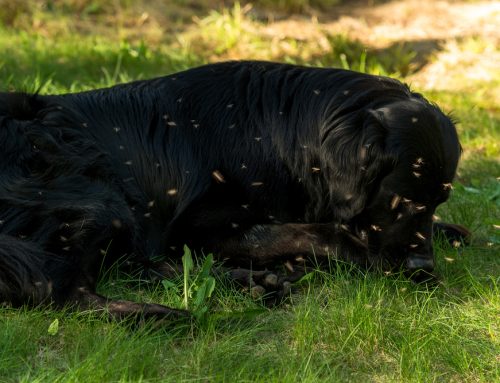 With Spring well on its way and summer fast approaching, protecting your pet from outdoor pests can be a matter of life and death.
With Spring well on its way and summer fast approaching, protecting your pet from outdoor pests can be a matter of life and death.
More than just irritants, pests such as mosquitoes, fleas, and ticks pose a serious health risk to cats and dogs enjoying the great outdoors. Likewise, snakes, bats, and other critters lurking in the underbrush can carry risks of their own that should be considered as you gear up for the months ahead.
Knowing what you and your pet are up against is just part of the battle. The rest is to know how to keep your pet safe and healthy in the face of what may happen. Here’s our list of issues to consider:
Heartworms
Heartworms pose a serious, if not fatal, threat to both cats and dogs. The parasite is transmitted through the bite of an already-infected mosquito, which has contracted the parasite by biting an infected animal (talk about a vicious cycle!).
For cats, heartworm is a fatal disease and for dogs the prognosis is not much better. While your dog can be treated, it is expensive and risky to do so.
The best way to protect your pet is through routine preventatives, which are prescribed by your veterinarian. For dogs, this will include a heartworm pre-screening.
As an incentive to get your pet properly prepared for the coming months, Billings Animal Family Hospital is offering 10% off Heartworm screenings. Please don’t hesitate to call us for an appointment!
Fleas and Ticks
Throughout the Spring and Summer months, fleas and ticks are a fact of life in Billings. And, as you probably know, if you’re going to protect your pets from these noxious pests, constant vigilance is required.
For fleas, prevention is the best means of protecting your pet. This means routine preventatives, as directed by your family vet. It is important to seek a consultation on which product is best for your pet, as not all preventatives are created equal and the wrong choice may not work, or worse.
Beyond that, do your best to remain vigilant for any sign of an infestation and take care of the problem immediately, if detected.
For ticks, prevention is also the key to keeping your pet healthy and free from the serious illnesses transmitted by these pests. Routine preventatives, as recommended by your family vet, will reduce the odds of your pet getting bitten. Still, constant vigilance with regard to tick checks after being outdoors are also important.
Rattlesnake Vaccines
 As spring turns to summer, the odds of your pet encountering a rattlesnake in our area increase. Luckily, a vaccine has been developed to help your dog survive a rattlesnake bite. Rattlesnake bites are about 25 times more fatal to dogs than humans. And, even if your dog does survive an attack, chances are high that your pet will have permanent damage.
As spring turns to summer, the odds of your pet encountering a rattlesnake in our area increase. Luckily, a vaccine has been developed to help your dog survive a rattlesnake bite. Rattlesnake bites are about 25 times more fatal to dogs than humans. And, even if your dog does survive an attack, chances are high that your pet will have permanent damage.
The vaccination against rattlesnake bites differs from antivenom in that the vaccine helps your pet’s immune system create antibodies against the venom, as opposed to receiving foreign antibodies to ward off the effects after the fact.
In our area, once your dog has received his or her initial inoculation, a booster should be given once a year, about 30 days before rattlesnake season begins. For more information on this preventative, or to schedule an inoculation or booster, please contact us.
Rabies
For many pet owners, rabies vaccinations are a matter of routine preventative care. But, like everything we tend to take for granted, it is easy to let the booster date slip by unnoticed and your pet’s vaccination expire.
As you prepare your pet for the coming season, don’t forget to double check that your pet’s rabies tags are current. This simple matter of routine care may one day save your pet’s life.






